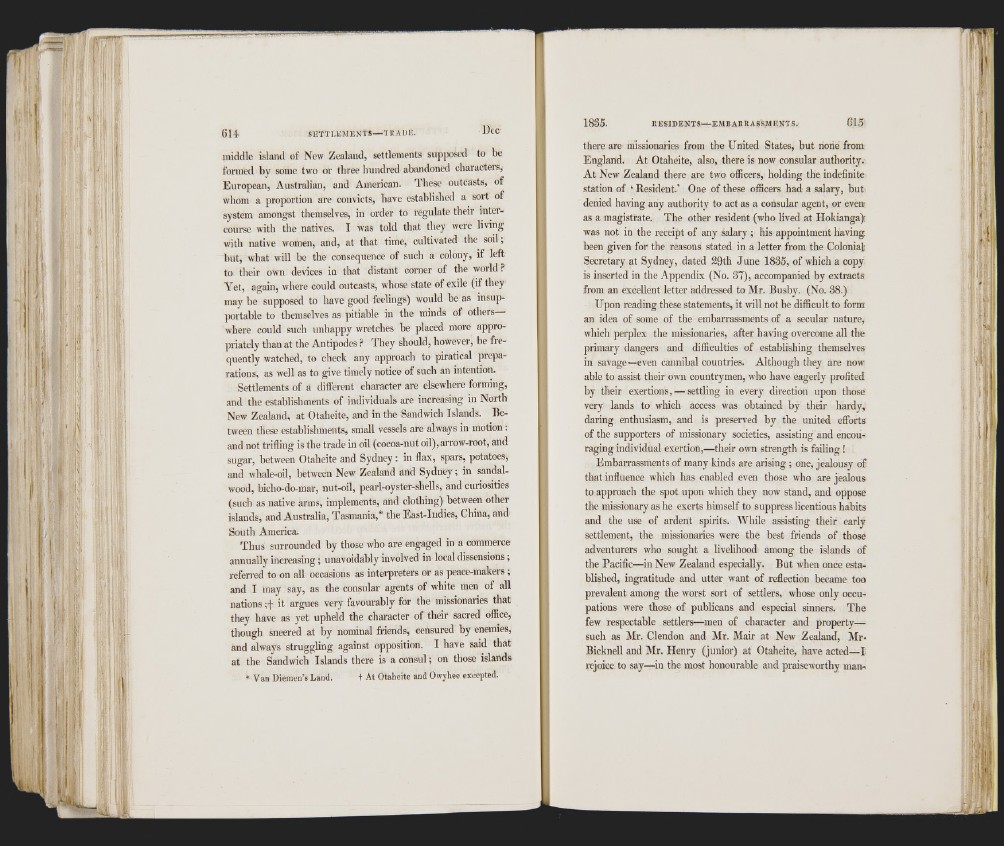
i V
i-
¡îi:
t I
614. s E X T1, E M E N T s— T1! A u F. Decmiddle
island of New Zealand, settlements supposed to be
formed by some two or three hundred abandoned characters,
European, Australian, and American. These outcasts, of
whom a proportion are convicts, have established a sort of
system amongst themselves, in order to regulate their intercourse
with the natives. I was told that they were living
with native women, and, at that time, cultivated the soil;
but, what will be the consequence of such a colony, if left
to their own devices in that distant corner of the world?
Yet, again, where could outcasts, whose state of exile (if they
may be supposed to have good feelings) would be as insupportable
to themselves as pitiable in the minds of others
where could such unhappy wretches be placed more appropriately
than at the Antipodes ? They should, however, be frequently
watched, to check any approach to piratical preparations,
as well as to give timely notice of such an intention.
Settlements of a different character are elsewhere forming,
and the establishments of individuals are increasing iu North
New Zealand, at Otaheite, and in the Sandwich Islands. Between
these establishments, small vessels are always in motion :
and not trifling is the trade in oil (cocoa-nut oil),arrow-root, and
sugar, between Otaheite and Sydney : in flax, spars, potatoes,
and whale-oil, between New Zealand and Sydney ; in sandalwood,
bicho-do-mar, nut-oil, pearl-oyster-shells, and curiosities
(such as native arms, implements, and clothing) between other
islands, and Australia, Tasmania,* the East-Indies, China, and
South America.
Thus surrounded by those who are engaged in a commerce
annually increasing ; unavoidably involved in local dissensions ;
referred to on all occasions as interpreters or as peace-makers ;
and I may say, as the consular agents of white men of all
nations ;]■ it argues very favourably for the missionaries that
they have as yet upheld the character of their sacred office,
though sneered at by nominal friends, censured by enemies,
and always struggling against opposition. I have said that
at the Sandwich Islands there is a consul ; on those islands
* Van Diemen’s L'and. t At Otaheite and Owyhee exoopted.
there are missionaries from the United States, but none from
England. At Otaheite, also, there is now consular authority.
At New Zealand there are two officers, holding the indefinite
station of ‘ Resident.’ One of these officers had a salary, but
denied having any authority to act as a consular agent, or even
as a magistrate. The other resident (who lived at filokianga):
was not in the receipt of any salary ; his appointment having
been given for the reasons stated in a letter from the Colonial
Secretary at Sydney, dated 29th June 1835, of which a copy
is inserted in the .Appendix (No. 37), accompanied by extracts
from an excellent letter addressed to Mr. Busby. (No. 38.)
Upon reading these statements, it will not be difficult to form
an idea of some of the embarrassments of a secular nature,
which perplex the missionaries, after having overcome all the
primary dangers and diificulties of establishing themselves
in savage—even cannibal countries. Although they are now
able to assist their own countrymen, who have eagerly profited
by their exertions, — settling in every direction upon those
very lands to which access was obtained by their hardy,
daring enthusiasm, and is preserved by the united efforts
of the supporters of missionary societies, assisting and encouraging
individual exertion,—their own strength is failing!
Embarrassments of many kinds are arising ; one, jealousy of
that influence which has enabled even those who are jealous
to approach the spot upon which they now stand, and oppose
the missionary as he exerts himself to suppress licentious habits
and the use of ardent spirits. While assisting their early
settlement, the missionaries were the best friends of those
adventurers who sought a livelihood among the islands of
the Pacific—in New Zealand especially. But when once established,
ingratitude and utter want of reflection became too
prevalent among the worst sort of settlers, whose only occupations
were those of publicans and especial sinners. The
few respectable settlers—men of chai-acter and property—
such as Mr. Clendon and Mr. Mair at New Zealand, Mr-
Bicknell and Mr. Henry (junior) at Otaheite, have acted—I
rejoice to say—iu the most honourable aud praiseworthy mani
r
ft
Ê
1
I'li,